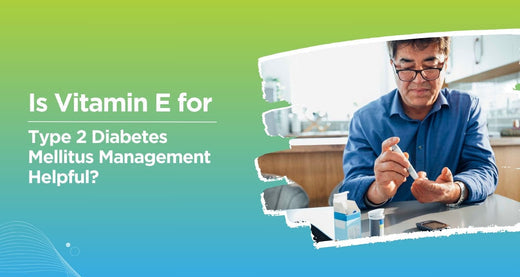Estimated Reading Time: 2 minutes
|Type 2 Diabetes Mellitus (T2DM) is a chronic condition that poses significant health challenges globally. Characterized by symptoms like excessive thirst, frequent urination, hunger, fatigue, and blurred vision, this condition primarily results from the body's inability to use insulin effectively.
Consequently, blood sugar levels remain persistently high, leading to various complications if not managed properly. The pathophysiology of T2DM involves insulin resistance and gradual pancreatic β-cell dysfunction, making blood sugar control a daily struggle for many.
Vitamin E: A Potent Antioxidant in Diabetes Management
In T2DM management, Vitamin E emerges as a notable player. This fat-soluble antioxidant plays a crucial role in combating oxidative stress, a significant factor in the development and progression of diabetes.
Oxidative stress results from an imbalance between free radicals and antioxidants in the body, leading to cell and tissue damage. Elevated blood sugar levels in diabetes further exacerbate this imbalance, making antioxidants like Vitamin E essential in a diabetic's diet.
Impact of Vitamin E on Blood Sugar Levels
Vitamin E's potential in regulating blood sugar levels is noteworthy. Several studies suggest that Vitamin E supplementation can improve glycemic control in individuals with T2DM. By reducing oxidative stress and improving insulin sensitivity, Vitamin E helps in the effective management of blood sugar levels.
This aspect is particularly crucial as maintaining blood sugar within a normal range is the cornerstone of diabetes management, preventing complications such as neuropathy, nephropathy, and retinopathy.
Tocopherols and Tocotrienols: The Two Faces of Vitamin E
Vitamin E is not a single compound but a group of eight fat-soluble compounds divided into tocopherols and tocotrienols. Each group consists of alpha, beta, gamma, and delta forms.
The tocotrienols, often overshadowed by the more commonly known tocopherols, have shown significant potential in diabetes management. Studies indicate that tocotrienols, particularly delta, and gamma-tocotrienols, may have superior antioxidant properties to tocopherols.
Clinical Evidence: Vitamin E and T2DM
Clinical evidence supporting the role of Vitamin E in T2DM is growing. Research indicates that tocotrienols can improve insulin sensitivity and lower the risk of developing diabetes-related complications.
In addition to their antioxidant properties, tocotrienols have been observed to have anti-inflammatory effects, which are beneficial in reducing the chronic inflammation often associated with T2DM.
Dietary Sources and Supplementation: How to Incorporate Vitamin E
Incorporating rich dietary sources is essential to harness the benefits of Vitamin E in managing T2DM. Foods such as almonds, sunflower seeds, spinach, and avocados are excellent sources.
However, for individuals with T2DM, dietary supplementation might be necessary to achieve therapeutic levels. It is crucial to consult with healthcare providers before starting any supplementation. Vitamin E's interaction with other medications and its effect on blood sugar levels need careful monitoring.
Conclusion: Embracing Vitamin E in Diabetes Care
In conclusion, Vitamin E, particularly tocotrienols, is a promising assistant therapy for managing Type 2 Diabetes Mellitus. By aiding in controlling blood sugar levels and reducing oxidative stress, Vitamin E can play a significant role in mitigating the symptoms and complications of T2DM.
However, it is essential to approach its use as part of a comprehensive diabetes management plan, which includes diet, exercise, and medication. As research continues to unfold the myriad benefits of this potent antioxidant, the future looks hopeful for those battling T2DM, with Vitamin E being a valuable ally in their journey towards better health.
Disclaimer: These statements have not been assessed by the FDA. The information contained within this page is for educational purposes only. It is not intended to replace the advice or attention of health care professionals.




































